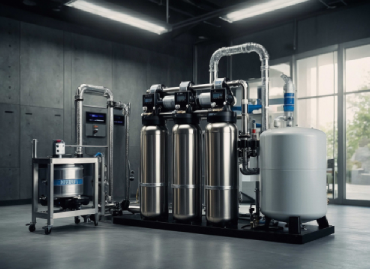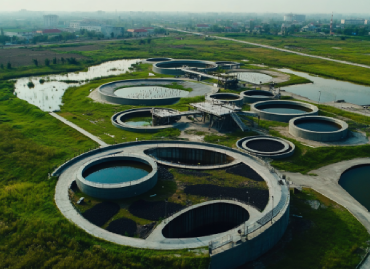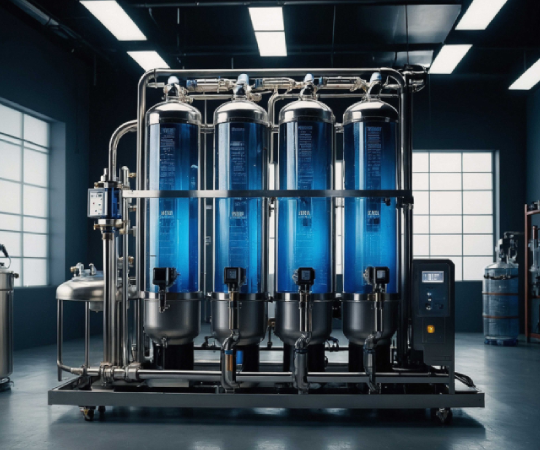- By Admin
- 26 Aug 2025
- WTP Plant
Agricultural Farm Industries Embrace Advanced Water Treatment Solutions for Sustainability and Environmental Protection
Agriculture is the backbone of India's economy, especially in states like Maharashtra, which is renowned for its varied agro-climatic conditions. The state's agricultural activities range from growing water-intensive crops like sugarcane and paddy to managing dairy and poultry operations.
Alongside crop cultivation, farm-based industries have evolved, with integrated agri-industries that combine processing, packaging, and manufacturing in one ecosystem. As agriculture in Maharashtra continues to grow, the water demand has also risen, leading to an increased need for sustainable water management practices. To meet this growing challenge, water and wastewater treatment systems, including STPs (Sewage Treatment Plants), ETPs (Effluent Treatment Plants), and RO (Reverse Osmosis) systems, have become essential components of agricultural infrastructure.
"Water is the lifeblood of agriculture, but its true value lies in how we manage it. Proper wastewater treatment and reuse aren't just necessary for food production—they are fundamental to sustaining the ecosystem and preserving our resources. In agriculture, every drop counts for a more sustainable future."
The Vital Role of Water in Agricultural Operations
Water is indispensable in almost every agricultural process. For crop irrigation, especially with water-intensive crops, massive volumes of water are needed, often resulting in high water consumption. Likewise, dairy and poultry farms also require water for animal consumption, hygiene, and cooling systems. In addition to direct agricultural use, water is heavily utilised in the value chain, such as washing produce, food processing, and packaging. However, inefficient water use can lead to environmental degradation, resource depletion, and non-compliance with regulations, making wastewater treatment crucial to the agriculture industry's sustainability.
The importance of maintaining water quality is not just confined to irrigation and animal care but extends to food safety and public health. Agricultural runoff, pesticide residues, and chemical residues can easily contaminate water sources if left untreated, impacting both the ecosystem and the communities dependent on these resources. This underscores the necessity of wastewater treatment to safeguard both farm productivity and the environment.


Sources of Wastewater in Agricultural and Farm-Based Industries
In agriculture, wastewater is generated from a variety of sources—each with different contaminants and treatment requirements. For instance, dairy farms produce organic-rich wastewater, often with high Biological Oxygen Demand (BOD), while food processing facilities create effluent with oils, fats, and chemicals from cleaning. Additionally, pesticide runoff from fields contributes to chemical contamination, which can pose significant risks to water quality.
Slurry from livestock operations, washing wastewater from equipment, and wastewater from agrochemical handling all contribute to the broader wastewater problem on farms. These wastewater streams need to be treated appropriately to prevent soil and water pollution. Without effective treatment, these contaminants can infiltrate groundwater supplies and local water bodies, causing lasting damage to ecosystems and human health.
Key Methods for Treating and Recycling Agricultural Wastewater
The treatment of wastewater in farm industries typically involves a combination of physical, biological, and chemical processes. Sewage Treatment Plants (STPs) and Effluent Treatment Plants (ETPs) are the primary technologies used for managing agricultural wastewater. The first step in most treatment systems involves physical processes like sedimentation to remove larger solids and debris. Biological treatment processes, such as the Moving Bed Biofilm Reactor (MBBR) and Anaerobic Digesters, break down organic matter and reduce the BOD levels in dairy or livestock effluent.
When dealing with chemical contaminants from pesticides, fertilisers, and agrochemicals, processes such as neutralisation, membrane filtration, and Reverse Osmosis (RO) are used to purify the water. These technologies ensure that the treated water can either be safely released into the environment or reused for non-potable applications, such as irrigation or equipment cleaning. Regular monitoring and optimisation of these systems ensure that water quality standards are met and that pollutants are removed before discharge.
Recycling and Reusing Water: A Key to Sustainability
n then be reused for various purposes, such as irrigation, cooling systems, and cleaning machinery. This reduces the dependency on freshwater sources, thus lowering operational costs and ensuring water sustainability in the long run.
Furthermore, technologies like IoT-based sensors are increasingly integrated into wastewater treatment systems to optimise plant performance and monitor water quality in real-time. These smart systems allow farmers to track water usage, detect leaks, and ensure that treatment processes meet environmental compliance standards. Such automation improves operational efficiency, minimises human error, and provides consistent water quality, making the farming process more sustainable.
Custom Water Treatment Solutions for Agriculture
To meet the unique needs of farm industries, customised water treatment solutions are essential. Our company specialises in designing, installing, and maintaining water treatment systems tailored to the specific requirements of agricultural operations. Whether it's an STP for a dairy farm or an ETP for a fruit processing unit, we provide reliable and efficient solutions to meet the wastewater challenges of agricultural industries.
Our systems are designed for modular installation, enabling easy expansion based on farm size and wastewater volume. We also offer annual maintenance contracts (AMC) to ensure that the systems continue to operate at peak efficiency throughout the year. With our expertise, we can help you reduce your water consumption, minimise wastewater discharge, and meet the sustainability goals set by industry regulators.
Summary And Conclusion
Water management in agriculture is essential for sustainable farm operations. Efficient wastewater treatment solutions, including STPs, ETPs, and RO systems, play a crucial role in ensuring water conservation and preventing environmental contamination. By adopting advanced technologies, farm industries can recycle and reuse treated water for irrigation, cleaning, and cooling, reducing reliance on freshwater sources. Tailored water treatment solutions provide the necessary infrastructure to meet the unique needs of agricultural operations while maintaining compliance with environmental regulations. Sustainable water management not only supports the farming industry but also contributes to preserving natural resources for future generations.































































